The Intel Kaby Lake-X i7 7740X and i5 7640X Review: The New Single-Threaded Champion, OC to 5GHz
by Ian Cutress on July 24, 2017 8:30 AM EST- Posted in
- CPUs
- Intel
- Kaby Lake
- X299
- Basin Falls
- Kaby Lake-X
- i7-7740X
- i5-7640X
Benchmarking Performance: CPU Legacy Tests
Our legacy tests represent benchmarks that were once at the height of their time. Some of these are industry standard synthetics, and we have data going back over 10 years. All of the data here has been rerun on Windows 10, and we plan to go back several generations of components to see how performance has evolved.
All of our benchmark results can also be found in our benchmark engine, Bench.
3D Particle Movement v1
3DPM is a self-penned benchmark, taking basic 3D movement algorithms used in Brownian Motion simulations and testing them for speed. High floating point performance, MHz and IPC wins in the single thread version, whereas the multithread version has to handle the threads and loves more cores. This is the original version, written in the style of a typical non-computer science student coding up an algorithm for their theoretical problem, and comes without any non-obvious optimizations not already performed by the compiler, such as false sharing.
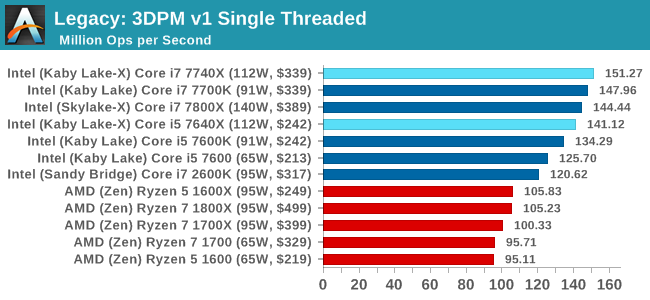
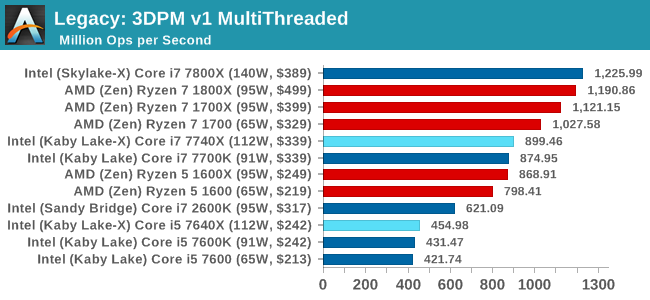
CineBench 11.5 and 10
Cinebench is a widely known benchmarking tool for measuring performance relative to MAXON's animation software Cinema 4D. Cinebench has been optimized over a decade and focuses on purely CPU horsepower, meaning if there is a discrepancy in pure throughput characteristics, Cinebench is likely to show that discrepancy. Arguably other software doesn't make use of all the tools available, so the real world relevance might purely be academic, but given our large database of data for Cinebench it seems difficult to ignore a small five-minute test. We run the modern version 15 in this test, as well as the older 11.5 and 10 due to our back data.
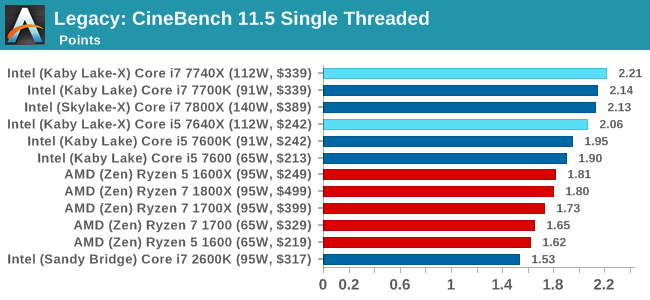
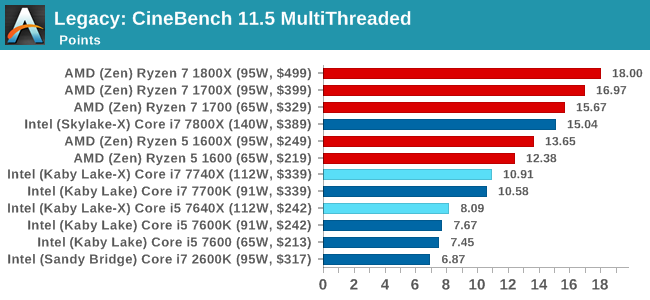
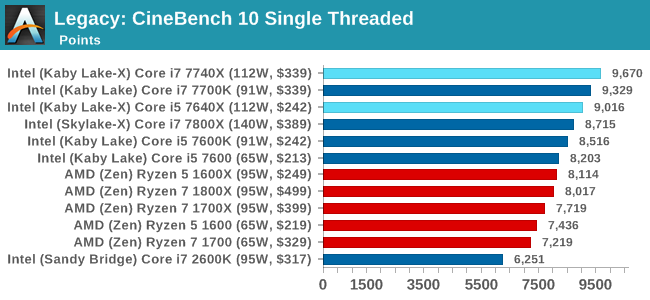

x264 HD 3.0
Similarly, the x264 HD 3.0 package we use here is also kept for historic regressional data. The latest version is 5.0.1, and encodes a 1080p video clip into a high-quality x264 file. Version 3.0 only performs the same test on a 720p file, and in most circumstances the software performance hits its limit on high-end processors, but still works well for mainstream and low-end. Also, this version only takes a few minutes, whereas the latest can take over 90 minutes to run.
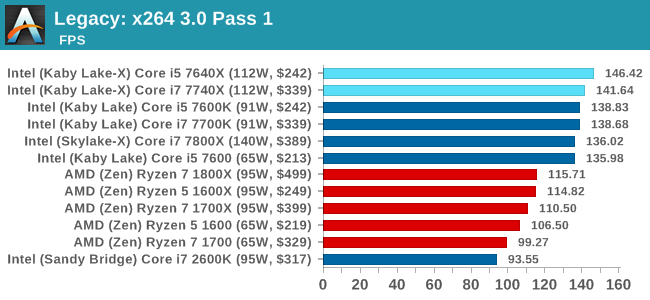
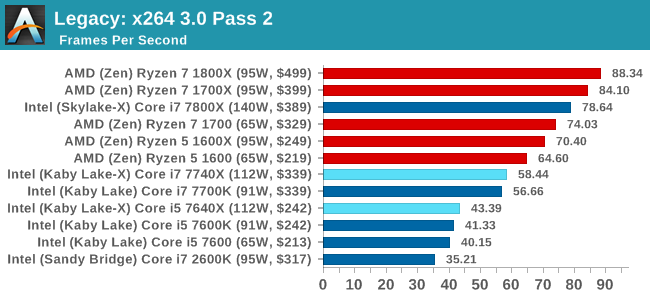










176 Comments
View All Comments
Ian Cutress - Monday, July 24, 2017 - link
*As specifically written down on that page and mentioned in the explanation for that benchmark*, GeoThermal Valley at 1080p on the GTX 1080 seems incredibly optimized: all the Core i5 chips do so much better than all the other chips.lixindiyi - Monday, July 24, 2017 - link
The frequency of Ryzen 7 1700 should be 3.0/3.7 GHz.Integr8d - Monday, July 24, 2017 - link
"After several years of iterative updates, slowly increasing core counts and increasing IPC, we have gotten used to being at least one generation of microarchitecture behind the mainstream consumer processor families. There are many reasons for this, including enterprise requirements for long support platforms as well as enterprise update cycles."You forgot 'milking their consumer, enthusiast and enterprise markets'...
Arbie - Monday, July 24, 2017 - link
Ian! You're a Brit - please help defend our common language. You meant to say "raises the question". "Begs the question" is totally different and does not even approximate what you intended.Journos: You don't have to understand "begs the question" because you'll very rarely need it. If you mean "raises the question" then just use that - plain English.
Mayank Singh - Monday, July 24, 2017 - link
Can someone explain how could the i5's could have got better performance than the i7 at 1080p?Ian Cutress - Monday, July 24, 2017 - link
Geothermal Valley on RoTR seems to be optimized for 1080p on a GTX 1080 and overly so, giving a lot more performance on that specific setup and test.Icehawk - Monday, July 24, 2017 - link
How is that possible? The i5 has slower clocks and less cache. So how can it be faster, "optimization" isn't valid here IMO unless I am missing something.I think you have a throttling issue or something else that needs to be examined. Monitoring long term clocks and temps is something that you need to look at incorporating if only to help validate results.
lucam - Monday, July 24, 2017 - link
When are you guys doing the iPad Pro review?dgz - Monday, July 24, 2017 - link
I remember a time when AT used to be a trustworthy. Who are you fulling, Ian? No one, that's who. Shame on you.Ian Cutress - Monday, July 24, 2017 - link
I've been called an AMD shill and an Intel shill in the space of two weeks. Fun, isn't it.